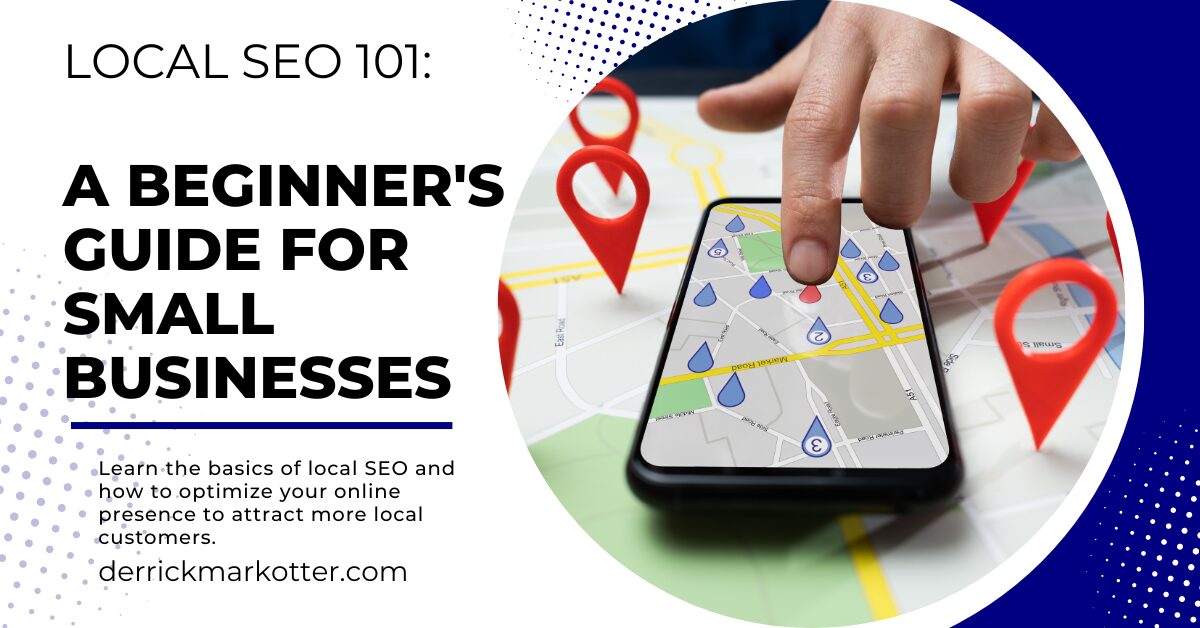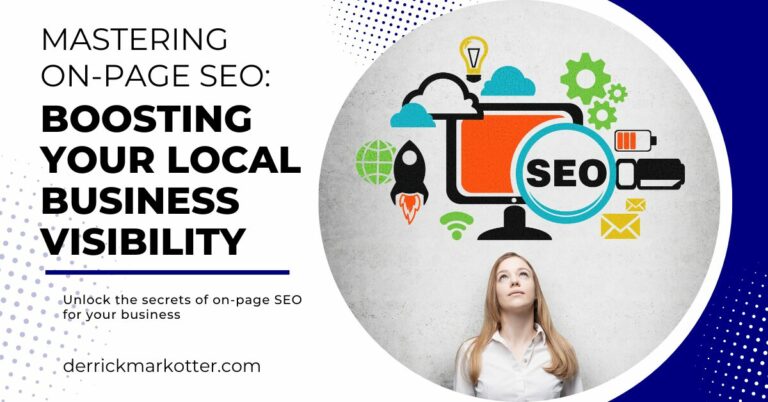Local SEO 101: A Beginner’s Guide for Small Businesses
Local SEO is a crucial strategy for small businesses to thrive. With the majority of consumers searching for local businesses online, optimizing your online presence for local visibility is essential. This comprehensive guide will provide you with a thorough understanding of local SEO and how to implement effective strategies to boost your local search rankings.
97% of consumers search for local businesses online. (BrightLocal: Local Consumer Review Survey 2023)
46% of all Google searches are local. (Google: Think with Google: The Mobile Movement)
Optimizing Your Google Business Profile Listing
Your Google Business Profile (GBP) is a powerful tool for local SEO. Here’s how to optimize it:
- Create or claim your listing: If you haven’t already, create a GBP listing for your business. If you have an existing listing, claim it to gain control and manage your information.
- Verify your business: Google requires businesses to verify their listings to ensure authenticity. Google has become quite strict about business verification, and in most cases these days they require video verification. This means shooting a live video on your mobile device, showing the location of your business, evidence that your business exists and proof of management.
- Complete your profile information: Provide accurate and comprehensive information about your business, including your business name, address, phone number, website, hours of operation, and a brief description.
- Add photos and videos: Showcase your business by adding high-quality photos and videos. Include images of your products, services, team, and business premises.
- Manage reviews: Encourage customers to leave reviews on your GBP listing. Respond to reviews promptly and professionally, addressing both positive and negative feedback. By being proactive about reputation management, you can protect your online reputation and build trust with potential customers.
Building Local Citations
Local citations are mentions of your business NAP (name, address, phone number) on other websites. Building citations helps search engines understand your business’s location and improves your local search visibility. Here are some ways to build citations:
- Directories and listings: Submit your business to local directories and online listings, such as Yelp, Yellow Pages, and Foursquare.
- Local business associations: Join local business associations and chambers of commerce. They often have online directories where you can list your business.
- Social media profiles: Create social media profiles for your business on platforms like Facebook, Twitter, and LinkedIn. Include your NAP and a link to your website.
- Press releases and local news: Reach out to local newspapers and online news outlets to see if they would be interested in featuring your business in a press release or article.
Social Media Posting for Local SEO
Social media is a powerful tool for local SEO. By building a following on social media and posting useful information, you can attract local customers and improve your local search visibility.
Building a Following
The first step to successful social media marketing is to build a following. Here are a few tips:
- Post high-quality content: Share content that is relevant to your target audience and provides value. This could include photos of your products or services, tips and advice, or local news and events.
- Use local hashtags: When posting on social media, use local hashtags to reach people in your area. For example, if you’re a restaurant in San Francisco, you could use the hashtag #SanFranciscoEats.
- Engage with your followers: Respond to comments and questions, and run contests and giveaways to generate excitement and build relationships.
Posting Useful Information
Once you have a following, it’s important to post useful information that will keep your followers engaged. Here are a few ideas:
- Share local news and events: Keep your followers up-to-date on what’s happening in your community. This could include upcoming festivals, concerts, or sporting events.
- Offer tips and advice: Share your expertise by offering tips and advice on topics related to your business. For example, if you’re a plumber, you could share tips on how to prevent frozen pipes in the winter.
- Run contests and giveaways: Contests and giveaways are a great way to generate excitement and build relationships with your followers. Offer prizes that are relevant to your target audience, such as gift certificates to your business or free products or services.
Google Business Profile Posts
Google Business Profile posts are a great way to share updates and promotions with your followers on Google. GBP posts appear in the “Updates” tab of your Google Business Profile listing, and they can also be shared on social media.
Here are a few tips for creating effective GBP posts:
- Keep it brief: GBP posts are limited to 1,500 characters, so keep your posts concise and to the point.
- Use high-quality images: Images are a great way to grab attention and make your posts more visually appealing. Use high-quality images that are relevant to your post.
- Include a call to action: Tell your followers what you want them to do, such as visit your website, call your business, or leave a review.
By following these tips, you can use social media to build a following, post useful information, and improve your local search visibility.
Posting Your Reviews on Social Media Platforms
Posting your Google reviews on other social media platforms is a great way to promote your business and encourage more people to leave reviews.
Here are a few tips for posting your Google reviews on other social media sites:
- Include a link to your Google Business Profile listing. Make it easy for people to find your business on Google by including a link to your Google Business Profile listing in your post.
- Use relevant hashtags. Hashtags are a great way to reach a wider audience on social media. When posting your Google reviews, use relevant hashtags that describe your business and the products or services you offer.
- Engage with your followers. Respond to comments and questions, and thank people for leaving reviews. This will help you build relationships with potential customers and encourage them to do business with you.
Optimizing Your Website for Local Search
Your website should be optimized for local search to improve your visibility in local search results. Here’s how:
- Use local keywords in your content: Incorporate local keywords into your website’s content, such as your city, neighborhood, or region. Use these keywords in your page titles, headings, and body text.
- Create location-specific pages: If you serve multiple locations, create specific landing pages for each location. Include the location’s NAP and other relevant information on these pages.
- Build backlinks from local websites: Acquire backlinks from reputable local websites, such as local newspapers, blogs, and business directories. Backlinks from local sources help improve your local search rankings.
- Use structured data markup: Use structured data markup to help search engines understand your business’s location and other important information. This can be done using schema.org microdata or JSON-LD.
Tracking and Measuring Your Local Search Results
It’s important to track and measure your local SEO performance to assess the effectiveness of your strategies. Here are some key metrics to monitor:
- Google Analytics and Google Search Console: Use Google Analytics to track website traffic and conversions. Use Google Search Console to monitor your search rankings and identify opportunities for improvement.
- Local search rankings: Track your local search rankings for relevant keywords using tools like Moz Local or BrightLocal.
- Website traffic and conversions: Monitor your website traffic and conversions to see how your local SEO efforts are impacting your business.
Advanced Local SEO Techniques
For advanced local SEO, consider implementing the following strategies:
- Local link building: Reach out to local businesses and websites in your industry to request backlinks to your website.
- Local content marketing: Create local content that is relevant to your target audience, such as blog posts about local events, tips, and resources.
- Geo-targeting your paid advertising campaigns: Target your paid advertising campaigns to specific geographic areas to reach potential customers in your local market.
Conclusion
Local SEO is a powerful tool for small businesses to attract local customers and grow their revenue. By implementing the strategies outlined in this comprehensive guide, you can improve your local search visibility, drive traffic to your website, and boost your overall business success. Embrace local SEO today and unlock the potential of the local search landscape.
Frequently Asked Questions About Local SEO
What is a backlink?
A backlink is a link from one website to another. In the context of local SEO, backlinks from other local businesses and websites can help improve your local search rankings. Backlinks act as votes of confidence for your website, indicating to search engines that your site is credible and relevant to local searches.
What is the difference between a backlink and a citation?
A citation is a mention of your business name, address, and phone number (NAP) on another website. Citations help search engines understand your business’s location and can improve your local search visibility. Backlinks, on the other hand, are links from one website to another. While backlinks can help improve your local search rankings, they are not the same as citations.
Why is local SEO important for my small business?
Local SEO is important for small businesses because it helps you attract local customers who are searching for products or services like yours. By optimizing your online presence for local search, you can improve your visibility in local search results and drive more traffic to your website and business.
How can I improve my local search rankings?
There are several things you can do to improve your local search rankings, including optimizing your Google Business Profile listing, building local citations, optimizing your website for local search, and tracking and measuring your results.
How often should I update my Google Business Profile listing?
You should update your Google Business Profile listing whenever your business information changes, such as your address, phone number, or hours of operation. It’s also a good idea to post regular updates, such as photos, videos, and events, to keep your listing active and engaging.
How can I get more customer reviews on Google?
There are several ways to get more customer reviews on Google. You can ask customers to leave reviews in person, via email, or through social media. You can also create a link that customers can use to leave reviews directly on your Google Business Profile listing.
How can I track my local SEO performance?
You can track your local SEO performance using Google Analytics and Google Search Console. Google Analytics can show you how much traffic your website is getting from local searches, while Google Search Console can show you how your website is ranking for local keywords.

